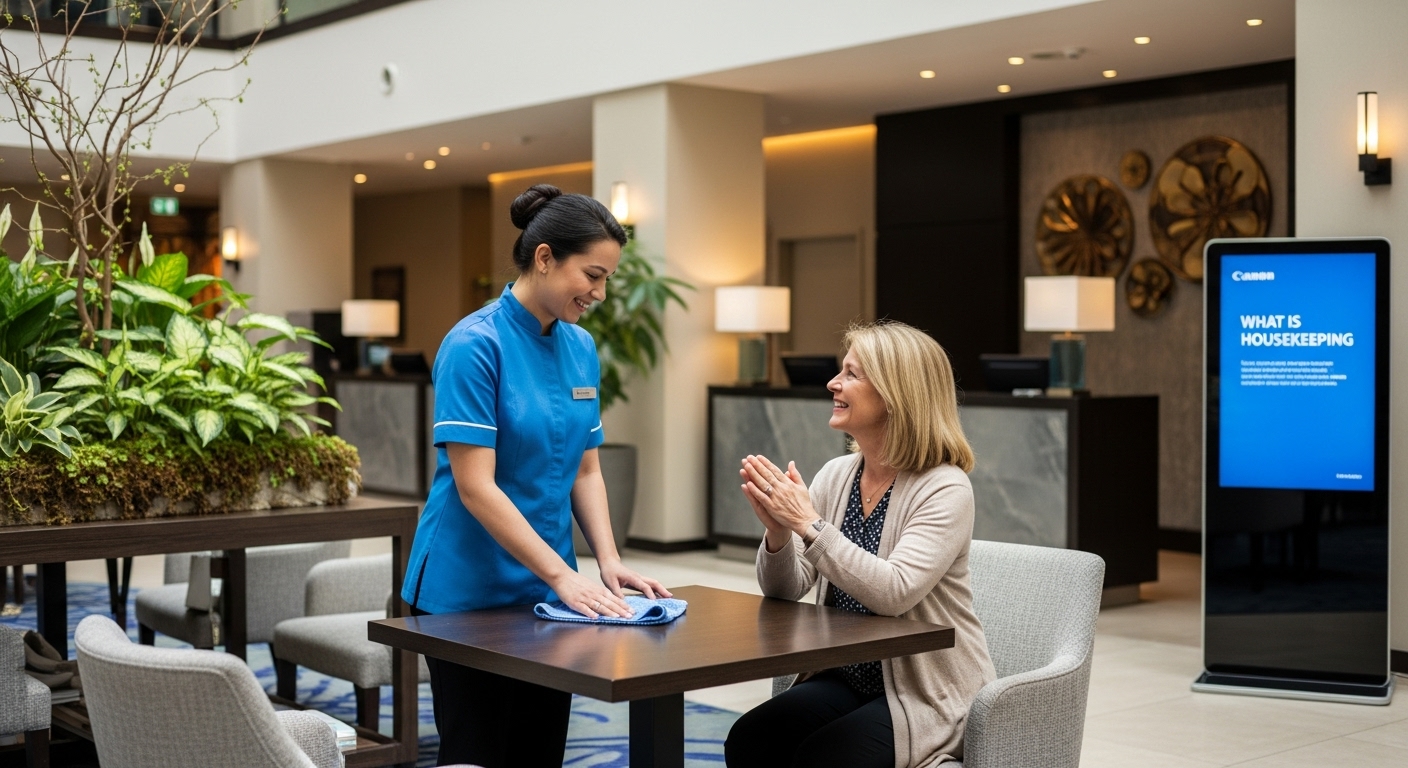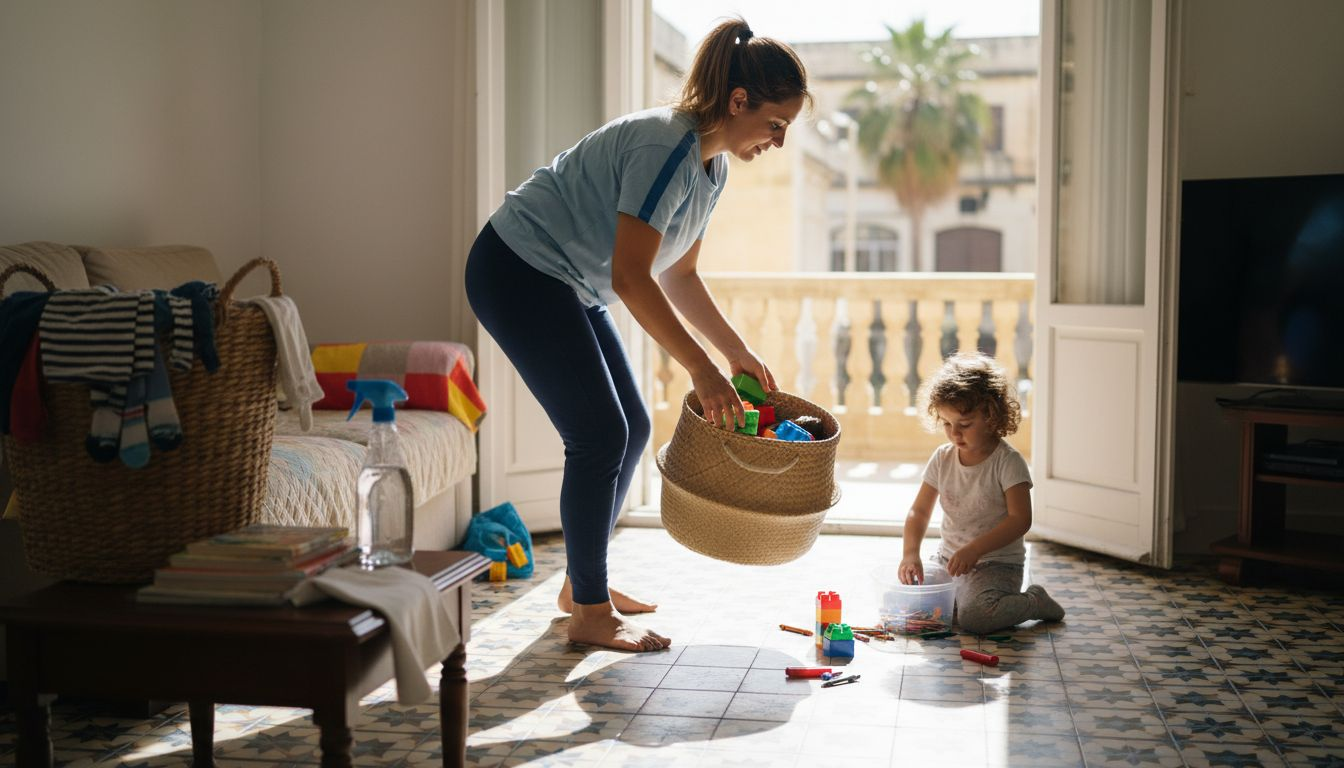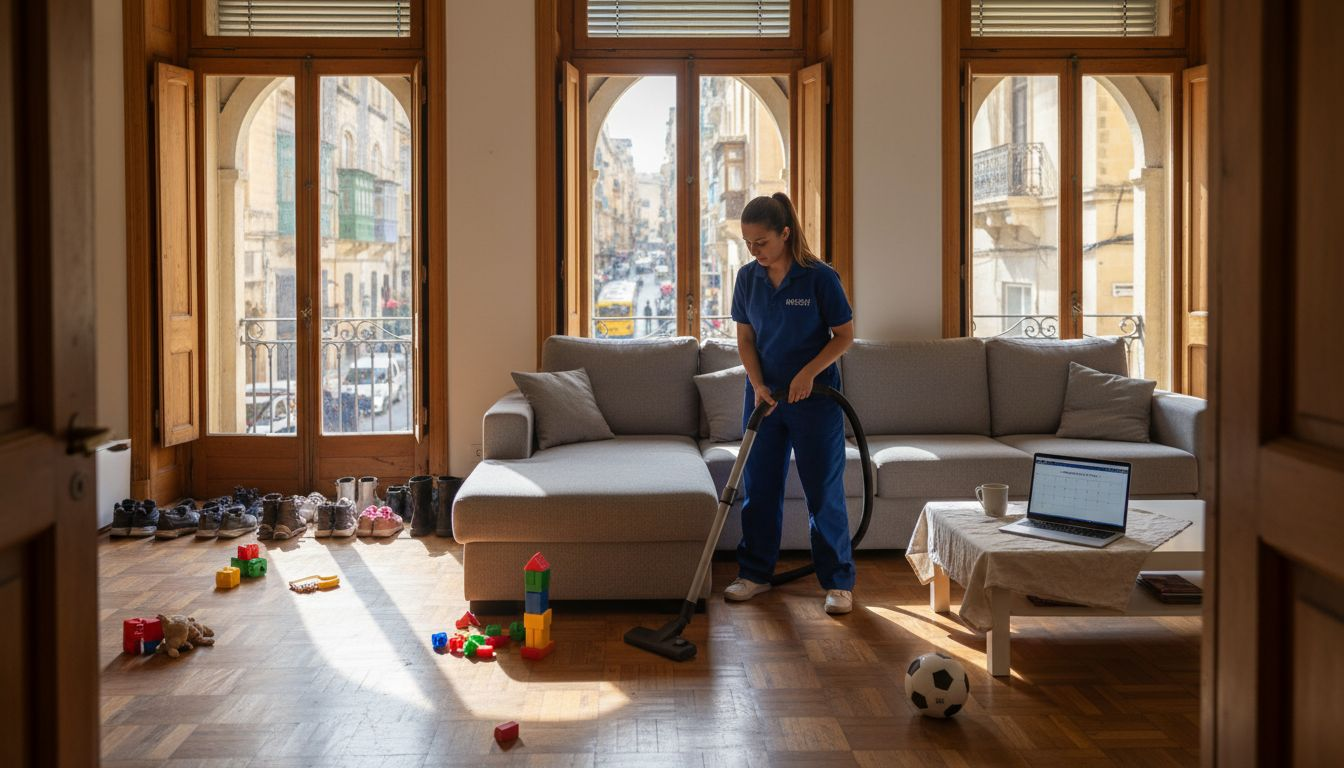Housekeeping shapes more than just tidy spaces and clean floors. A clean environment can boost mental well-being and productivity, with clutter linked to higher anxiety and reduced focus. Most people assume housekeeping is all about dusting, scrubbing, and making beds. In reality, it drives health, safety, and even economic value by protecting against disease, extending the lifespan of assets, and transforming work and living environments from the inside out.
Table of Contents
- Defining Housekeeping: Core Concepts And Responsibilities
- The Importance Of Housekeeping In Daily Life
- How Housekeeping Contributes To Health And Well-Being
- Exploring Different Aspects Of Housekeeping
- Real-World Applications: Housekeeping In Various Settings
Quick Summary
| Takeaway | Explanation |
|---|---|
| Housekeeping ensures cleanliness and safety. | Regular cleaning and sanitization create hygienic environments that promote health and safety in various settings. |
| Organized spaces enhance mental well-being. | Clean and organized environments reduce stress, boost focus, and foster emotional balance for improved productivity. |
| Health risks are minimized through effective cleaning. | Consistent housekeeping practices lower exposure to allergens and pathogens, supporting overall respiratory health and safety. |
| Housekeeping techniques vary by environment. | Professionals must adapt cleaning methods based on the context, such as healthcare, hospitality, or industrial settings. |
| Modern housekeeping incorporates technology for efficiency. | Smart cleaning tools and eco-friendly products enhance cleaning effectiveness while minimizing environmental impact. |
Defining Housekeeping: Core Concepts and Responsibilities
Housekeeping represents a comprehensive professional discipline focused on maintaining cleanliness, order, and functionality across various environments. At its core, housekeeping involves systematic management of physical spaces to ensure hygiene, safety, and aesthetic appeal.
The Fundamental Role of Housekeeping
Housekeeping extends far beyond simple cleaning tasks. Learn more about professional cleaning techniques in various settings. This multifaceted profession encompasses several critical responsibilities that maintain the overall quality and operational standards of different spaces.
According to research from the California Department of Human Resources, housekeeping professionals are responsible for:
- Cleaning and sanitizing designated areas
- Managing and organizing physical spaces
- Maintaining equipment and supplies
- Ensuring compliance with health and safety standards
Key Areas of Responsibility
Housekeeping professionals operate across diverse environments such as hotels, hospitals, offices, residential facilities, and industrial settings. Each context demands specialized skills and an understanding of specific cleaning protocols. Professional housekeepers must adapt their techniques to meet unique environmental requirements, whether managing delicate medical equipment or maintaining large commercial spaces.
Below is a table outlining how housekeeping practices and focus areas compare across different settings, helping to illustrate the distinct demands in professional environments.
| Environment | Primary Focus Areas | Specialized Practices |
|---|---|---|
| Healthcare Facilities | Infection control, patient safety | Sterilization, strict decontamination protocols |
| Hospitality (Hotels, etc.) | Guest experience, aesthetics | Presentation, fast turnover cleaning |
| Industrial/Commercial Settings | Equipment maintenance, safety | Specialized equipment cleaning, hazard management |
| Offices/Corporate Environments | Organization, safety, productivity | Routine workspace cleaning, compliance |
| Residential | Personal comfort, hygiene | General cleaning, allergen control |
The role requires a combination of technical skills, attention to detail, physical stamina, and an understanding of complex cleaning systems. Housekeepers must be knowledgeable about different cleaning agents, equipment, safety procedures, and sanitation standards to effectively perform their duties.
Beyond physical cleaning, housekeeping plays a crucial role in creating safe, comfortable, and hygienic environments that support human health, productivity, and well-being. From preventing the spread of infections to maintaining aesthetic standards, housekeeping professionals contribute significantly to the overall quality of institutional and personal spaces.
The Importance of Housekeeping in Daily Life
Housekeeping transcends mere cleaning activities and plays a crucial role in maintaining personal and professional environments. Its significance extends far beyond surface-level tidiness, impacting mental health, productivity, safety, and overall quality of life.
This table summarizes the primary ways that housekeeping contributes to both physical and psychological health, organizing key benefits for clarity.
| Area of Contribution | How Housekeeping Helps |
|---|---|
| Physical Health & Safety | Reduces bacteria, minimizes allergens, supports respiratory health |
| Mental Well-being | Lowers stress, enhances focus, increases sense of control |
| Accident Prevention | Keeps spaces organized to prevent slips, trips, and injuries |
| Asset Preservation | Extends lifespan of items, reduces long-term costs |
Physical Health and Safety
Discover how professional cleaning impacts wellness, housekeeping serves as a critical defense mechanism against potential health risks. According to research from Carnegie Mellon University, consistent cleaning practices directly contribute to:
- Reducing exposure to harmful bacteria and pathogens
- Minimizing potential allergen accumulation
- Creating environments that support respiratory health
- Preventing accidents through organized spaces
Psychological and Productivity Benefits
A clean environment significantly influences mental well-being and cognitive performance. Organized spaces reduce stress, enhance focus, and create a sense of control. Professional and personal environments that are systematically maintained help individuals feel more relaxed, motivated, and capable of achieving their goals.
The psychological impact of good housekeeping cannot be overstated. Cluttered spaces often lead to increased anxiety, decreased concentration, and reduced overall productivity. By maintaining clean and organized environments, individuals can create mental spaces that support emotional balance and mental clarity.
Economic and Long-term Value
Effective housekeeping represents a strategic investment in personal and professional assets. Regular maintenance prevents deterioration, extends the lifespan of furniture and equipment, and reduces long-term repair and replacement costs. Homes and workspaces that receive consistent care maintain their value and aesthetic appeal, demonstrating that housekeeping is not just an expense but a valuable preservation strategy.
How Housekeeping Contributes to Health and Well-being
Housekeeping plays a fundamental role in protecting and promoting human health through systematic approaches that minimize potential health risks and create environments conducive to physical and mental wellness.
Preventing Disease and Infection
Learn more about professional cleaning strategies that safeguard health. According to research from the European Agency for Safety and Health at Work, proper housekeeping practices are critical in:
- Reducing pathogen transmission
- Eliminating potential breeding grounds for harmful microorganisms
- Maintaining hygienic surfaces in high-contact areas
- Supporting overall environmental sanitation
Respiratory and Allergen Management
Effective housekeeping directly impacts respiratory health and reduces allergen exposure. Regular cleaning removes dust, pollen, mold spores, and other microscopic particles that can trigger respiratory issues, allergies, and chronic health conditions. Professional cleaning techniques target hidden sources of potential health hazards, creating environments that support optimal breathing and minimize inflammatory responses.
By systematically removing accumulated dust and debris, housekeeping helps individuals with respiratory sensitivities maintain healthier living and working spaces. This proactive approach can significantly reduce the frequency and severity of allergic reactions and respiratory complications.

Mental Health and Environmental Wellness
Beyond physical health, housekeeping contributes substantially to mental well-being. Organized, clean environments reduce psychological stress, promote cognitive clarity, and create spaces that support emotional balance. The visual and sensory experience of a well-maintained environment can lower anxiety levels, improve mood, and enhance overall mental resilience.
Professional housekeeping goes beyond surface cleaning, creating holistic environments that nurture both physical and psychological health. By understanding the intricate connection between environmental conditions and personal wellness, individuals can leverage systematic cleaning practices as powerful tools for comprehensive health management.
Exploring Different Aspects of Housekeeping
Housekeeping represents a complex and multifaceted profession that extends far beyond traditional cleaning activities, encompassing diverse domains and specialized practices across various professional and personal environments.
Institutional and Professional Housekeeping
Discover specialized cleaning approaches that transform different work environments. According to research from the Institut de Ciencies del Mar, housekeeping involves multiple critical dimensions:
- Maintaining operational infrastructure
- Supporting organizational effectiveness
- Ensuring compliance with professional standards
- Managing resource allocation and maintenance
Specialized Housekeeping Domains
Housekeeping practices vary dramatically across different sectors and environments. Healthcare facilities require stringent infection control protocols, while hospitality settings prioritize aesthetic presentation and guest experience. Industrial environments focus on safety and equipment maintenance, and residential housekeeping emphasizes personal comfort and hygiene.
Each specialized domain demands unique skill sets, technical knowledge, and understanding of specific regulatory requirements.
Professionals must adapt their techniques, use specialized equipment, and implement sector-specific cleaning methodologies to meet distinct operational standards.

Emerging Trends and Technological Integration
Modern housekeeping increasingly incorporates advanced technologies and sustainable practices. Smart cleaning systems, environmentally friendly products, and data-driven maintenance strategies are transforming traditional approaches. Robotic cleaning equipment, advanced air purification systems, and digital tracking of cleaning processes represent the cutting edge of professional housekeeping, enabling more efficient, precise, and comprehensive maintenance strategies.
Real-World Applications: Housekeeping in Various Settings
Housekeeping practices are dynamically adapted across different environments, demonstrating remarkable versatility in addressing unique operational requirements and maintaining optimal functional standards.
Corporate and Professional Environments
Explore professional cleaning strategies that enhance workplace efficiency. According to research from Carnegie Mellon University, professional housekeeping involves critical workplace management practices:
- Preventing workplace accidents
- Maintaining clean and organized workspaces
- Supporting employee health and productivity
- Ensuring compliance with safety regulations
Healthcare and Specialized Institutional Settings
Housekeeping in healthcare environments represents a critical line of defense against infection and disease transmission. Hospitals, clinics, and medical facilities require extraordinarily precise cleaning protocols that go beyond traditional cleaning approaches. Specialized techniques involving sterilization, contamination prevention, and targeted disinfection protocols are essential for maintaining patient safety and preventing cross-contamination.
These environments demand rigorous training, advanced technical knowledge, and strict adherence to complex regulatory standards. Housekeeping professionals must understand intricate medical equipment, use specialized cleaning agents, and follow precise decontamination procedures.
Sustainable and Technology-Driven Approaches
Modern housekeeping increasingly integrates sustainable practices and advanced technological solutions. Environmentally friendly cleaning products, energy-efficient equipment, and data-driven maintenance strategies are transforming traditional approaches. Professionals now utilize smart cleaning technologies, digital tracking systems, and eco-conscious methodologies that minimize environmental impact while maximizing operational efficiency.
Transform Your Space with Effortless Housekeeping Solutions
Are you tired of stressful cleaning routines and struggling to maintain a healthy, organized environment? The article explores how consistent housekeeping improves health, mental clarity, and overall well-being. Yet, for busy people in Malta, finding time for proper cleaning and specialized care can feel overwhelming. If clutter and lack of time are undercutting your productivity or peace of mind, you are not alone. Many face the challenge of managing workplaces or homes where professional cleaning standards are hard to reach alone.

Take the next step today for a cleaner, safer tomorrow. Choose Rozie for your housekeeping needs. Our Uber for cleaning in Malta connects you instantly with trusted local cleaning professionals, so you get results without stress. Convenient. Reliable. Tailored to your needs. Let our experts handle the hard work so you can enjoy a spotless space. Ready to experience the positive impact mentioned in the article? Book your cleaning now and see the difference for yourself.
Frequently Asked Questions
What are the primary responsibilities of housekeeping professionals?
Housekeeping professionals are responsible for cleaning and sanitizing designated areas, managing and organizing physical spaces, maintaining equipment and supplies, and ensuring compliance with health and safety standards.
How does housekeeping contribute to physical and mental health?
Effective housekeeping minimizes health risks by reducing exposure to harmful bacteria and allergens, while also promoting mental well-being by creating organized, clean environments that lower stress and enhance focus.
Why is professional housekeeping important in healthcare settings?
In healthcare settings, professional housekeeping is crucial for preventing infection and disease transmission. It involves strict adherence to cleaning protocols, sterilization, and the use of specialized techniques to maintain patient safety.
What are some emerging trends in housekeeping?
Modern housekeeping is increasingly integrating advanced technologies like smart cleaning systems and eco-friendly practices. These innovations allow for more efficient maintenance strategies and a reduced environmental impact.



